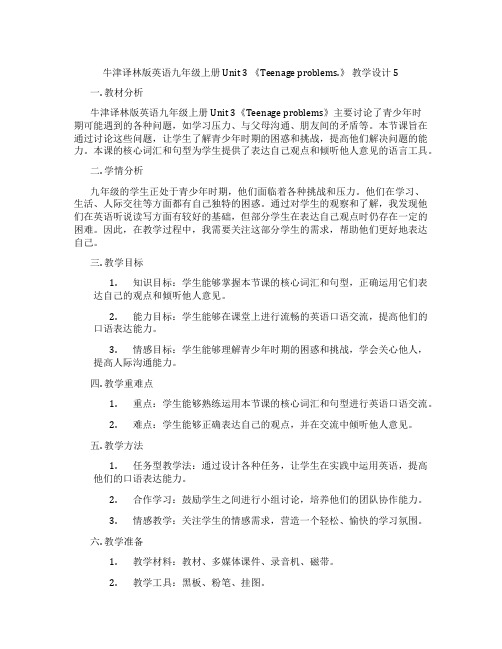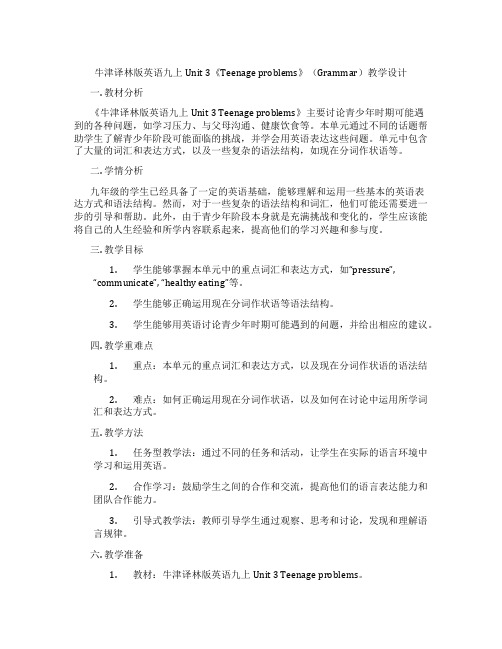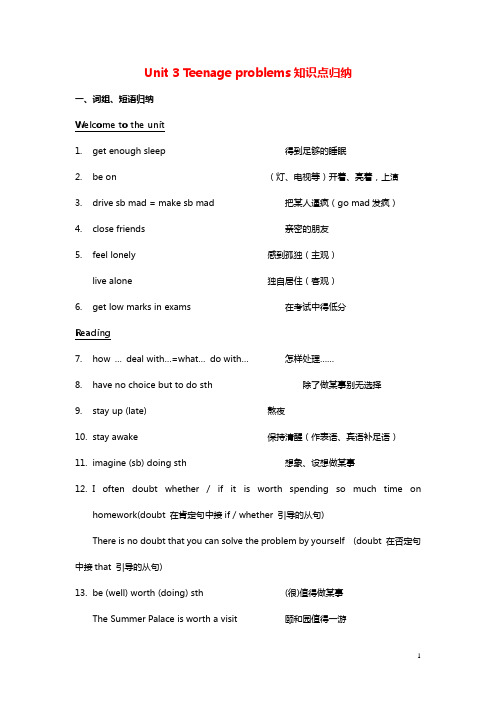九年级英语上册 unit3 GrammarII《Teenage problems》课件 牛津译林版
牛津译林版英语九年级上册 Unit 3 《Teenage problems.》 教学设计5

牛津译林版英语九年级上册 Unit 3 《Teenage problems.》教学设计5一. 教材分析牛津译林版英语九年级上册Unit 3《Teenage problems》主要讨论了青少年时期可能遇到的各种问题,如学习压力、与父母沟通、朋友间的矛盾等。
本节课旨在通过讨论这些问题,让学生了解青少年时期的困惑和挑战,提高他们解决问题的能力。
本课的核心词汇和句型为学生提供了表达自己观点和倾听他人意见的语言工具。
二. 学情分析九年级的学生正处于青少年时期,他们面临着各种挑战和压力。
他们在学习、生活、人际交往等方面都有自己独特的困惑。
通过对学生的观察和了解,我发现他们在英语听说读写方面有较好的基础,但部分学生在表达自己观点时仍存在一定的困难。
因此,在教学过程中,我需要关注这部分学生的需求,帮助他们更好地表达自己。
三. 教学目标1.知识目标:学生能够掌握本节课的核心词汇和句型,正确运用它们表达自己的观点和倾听他人意见。
2.能力目标:学生能够在课堂上进行流畅的英语口语交流,提高他们的口语表达能力。
3.情感目标:学生能够理解青少年时期的困惑和挑战,学会关心他人,提高人际沟通能力。
四. 教学重难点1.重点:学生能够熟练运用本节课的核心词汇和句型进行英语口语交流。
2.难点:学生能够正确表达自己的观点,并在交流中倾听他人意见。
五. 教学方法1.任务型教学法:通过设计各种任务,让学生在实践中运用英语,提高他们的口语表达能力。
2.合作学习:鼓励学生之间进行小组讨论,培养他们的团队协作能力。
3.情感教学:关注学生的情感需求,营造一个轻松、愉快的学习氛围。
六. 教学准备1.教学材料:教材、多媒体课件、录音机、磁带。
2.教学工具:黑板、粉笔、挂图。
七. 教学过程1.导入(5分钟)利用多媒体展示一些青少年时期常见的问题,如学习压力、与父母沟通等。
引导学生谈论这些问题,激发他们的兴趣。
2.呈现(10分钟)呈现本节课的核心词汇和句型,让学生通过听力练习和小组讨论来熟悉这些词汇和句型。
牛津译林版英语九上Unit 3《Teenage problems》(Grammar)教学设计

牛津译林版英语九上Unit 3《Teenage problems》(Grammar)教学设计一. 教材分析《牛津译林版英语九上Unit 3 Teenage problems》主要讨论青少年时期可能遇到的各种问题,如学习压力、与父母沟通、健康饮食等。
本单元通过不同的话题帮助学生了解青少年阶段可能面临的挑战,并学会用英语表达这些问题。
单元中包含了大量的词汇和表达方式,以及一些复杂的语法结构,如现在分词作状语等。
二. 学情分析九年级的学生已经具备了一定的英语基础,能够理解和运用一些基本的英语表达方式和语法结构。
然而,对于一些复杂的语法结构和词汇,他们可能还需要进一步的引导和帮助。
此外,由于青少年阶段本身就是充满挑战和变化的,学生应该能将自己的人生经验和所学内容联系起来,提高他们的学习兴趣和参与度。
三. 教学目标1.学生能够掌握本单元中的重点词汇和表达方式,如“pressure”,“communicate”, “healthy eating”等。
2.学生能够正确运用现在分词作状语等语法结构。
3.学生能够用英语讨论青少年时期可能遇到的问题,并给出相应的建议。
四. 教学重难点1.重点:本单元的重点词汇和表达方式,以及现在分词作状语的语法结构。
2.难点:如何正确运用现在分词作状语,以及如何在讨论中运用所学词汇和表达方式。
五. 教学方法1.任务型教学法:通过不同的任务和活动,让学生在实际的语言环境中学习和运用英语。
2.合作学习:鼓励学生之间的合作和交流,提高他们的语言表达能力和团队合作能力。
3.引导式教学法:教师引导学生通过观察、思考和讨论,发现和理解语言规律。
六. 教学准备1.教材:牛津译林版英语九上Unit 3 Teenage problems。
2.多媒体教学设备:用于展示PPT和视频材料。
3.教学素材:与本单元主题相关的图片、视频等。
七. 教学过程1.导入(5分钟)通过提问方式引导学生谈论他们所知道的青少年时期的问题,激发学生的兴趣和参与度。
牛津译林版九年级上册Unit 3《Teenage problems》(Study skills)教学

牛津译林版九年级上册Unit 3《Teenage problems》(Study skills)教学设计一. 教材分析牛津译林版九年级上册Unit 3《Teenage problems》(Study skills)围绕着青少年的学习方法展开,旨在让学生通过阅读、听力、口语和写作等环节,了解并掌握各种学习方法,以及如何有效地解决学习中遇到的问题。
本节课的主要内容包括:不同学生有不同的学习风格和策略,如何选择适合自己的学习方法,以及如何养成良好的学习习惯等。
二. 学情分析九年级的学生已经具备了一定的英语基础,能够进行简单的听、说、读、写操作。
但部分学生在面对较复杂的文章时,可能会存在阅读困难,理解能力有限。
此外,学生对学习方法和策略的认识相对较弱,需要老师在教学中进行引导和启发。
三. 教学目标1.知识目标:让学生掌握与学习方法相关的词汇和表达,如effective,strategy, improve等。
2.能力目标:培养学生通过阅读、听力、口语和写作等多种方式,理解和运用本节课所学内容。
3.情感目标:引导学生认识到学习方法的重要性,激发学生探索适合自己的学习方法,养成良好的学习习惯。
四. 教学重难点1.重点:让学生理解和运用本节课所学词汇和表达。
2.难点:引导学生如何选择适合自己的学习方法,以及如何养成良好的学习习惯。
五. 教学方法1.任务型教学法:通过设定各种任务,让学生在实践中学习和运用英语。
2.合作学习法:鼓励学生分组讨论,培养学生的团队协作能力。
3.情感教学法:关注学生的情感需求,激发学生的学习兴趣。
六. 教学准备1.教材:牛津译林版九年级上册Unit 3《Teenage problems》(Studyskills)2.多媒体设备:电脑、投影仪、音响等3.教学素材:相关学习方法的文章、视频等4.课件:制作与本节课相关的内容,包括词汇、图片、视频等七. 教学过程1.导入(5分钟)利用课件展示一些关于学习方法的名言,如“活到老,学到老”、“适合自己的才是最好的”等,引导学生思考如何选择适合自己的学习方法。
Unit 3 Teenage problems-Grammar课件 译林牛津版九年级英语上册(36张

Unit 3 Teenage problems-Grammar课件译林牛津版九年级英语上册(36张PPT)(共36张PPT)GrammarUnit 3 Teenage problemsLearning Aims1. Master object clauses introduced by question words.2. The ways of giving suggestions.自学检测汉译英1.需要安静2.分享我的烦恼3.解决问题4.查找字典5.回复邮件need silenceshare my worriessolve the problemlook…up in a dictionaryreply to the emailRevision什么是宾语?宾语是动作、行为的对象,是动作的承受者。
宾语由名词、代词、不定式或相当于名词的词、短语来担任。
I like my teacher.(名词作宾语)I enjoy playing basketball.(动名词作宾语)I decide to study hard.(不定式作宾语)I know him .(代词作宾语)Translate the sentences.1. 我经常怀疑是否值得花如此多的时间在家庭作业上。
__________________________________________________________ 2. 我不能理解为什么他们对我如此严格。
___________________________________________________________ I often doubt whether it is worth spending so much time on homeworkI do not understand why they are so strict with me.Revision在复合句中用作宾语的从句叫做宾语从句。
Unit3TeenageproblemsGrammar课件牛津译林版英语九年级上册

Unit 3 Teenage Problems
Grammar
Simon’s problems
why they are so strict with him.
how he can achieve a balance between his schoolwork and his hobbies
when they should stop
C.how many bridges are there in Wuhan D.what will I study in Wuhan University
2.He told me (that) Summer
after Spring.
A. is
B. are
C. was
D. were
Pay attention
变,如以下句子:
Which woman is your mother? what is the matter with you? What is wrong with your machine? who broke the glass? What’s happening over there? What happened?
初中英语九年级上册Unit3Teenageproblems知识点总结新版牛津版

Unit 3 Teenage problems知识点归纳一、词组、短语归纳Welcome to the unit1.get enough sleep 得到足够的睡眠2.be on (灯、电视等)开着、亮着,上演3.drive sb mad = make sb mad 把某人逼疯(go mad发疯)4.close friends 亲密的朋友5.feel lonely 感到孤独(主观)live alone 独自居住(客观)6.get low marks in exams 在考试中得低分Reading7.how …deal with…=what…do with…怎样处理……8.have no choice but to do sth 除了做某事别无选择9.stay up (late) 熬夜10.stay awake 保持清醒(作表语、宾语补足语)11.imagine (sb) doing sth 想象、设想做某事12.I often doubt whether / if it is worth spending so much time onhomework(doubt 在肯定句中接if / whether 引导的从句)There is no doubt that you can solve the problem by yourself (doubt 在否定句中接that 引导的从句)13.be (well) worth (doing) sth (很)值得做某事The Summer Palace is worth a visit 颐和园值得一游The picture is worth 20 dollars 这张图片至少值二十美元The book is well worth reading /It's well worth reading the book.这本书很值得一读。
14.so that 以便,为了(引导目的状语从句,从句中常用情态动词)so + adj /adv + that 如此…以至于…(引导结果状语从句)15.offer sb. sth. = offer sth. to sb. 为某人提供某物16.provide sb with sth = provide sth for sb 为某人提供某物17.offer sb some suggestions/ advice= offer some suggestions to me18.offer to do sth 主动提出做某事19.hear from sb.(短暂性动作)= get/receive a letter from sb.(短暂性动作)=have a letter from sb.(延续性动作)收到某人来信20.be crazy about…对…..很着迷21.my love of football 我对足球的热爱22.the cause of ……的原因23.get into trouble 陷入麻烦24.allow sb to do sth 允许某人做某事25.be strict with sb 对某人要求严格be strict in sth 对某事要求严格26.develop our hobbies 培养我们的爱好27.stay out late 呆在外面很晚28.achieve a balance 获得平衡29.valuable advice 宝贵的建议(adj只能修饰物,不能修饰人, value ,n 价值)30.make a list of…列一个…..清单31.work out 算出,解决,制定出…..(代词放中间)32.according to 根据(介词短语),据……所说33.my advice is worth taking 我的建议值得采纳34.take /follow one's advice 接受/采纳某人的建议35.It seems/seemed that 似乎,好像36.It is better for you to go home earlier 你最好早点回家37.= You’d better go home earlier38.forget about sth. 忘记有关…的事Grammar and Integrated Skills and Study Skills39.need /keep silence 需要安静/ 保持安静(silence ,n---silent adj 寂静的)40.need someone to share my worries 需要有人分担我的忧愁41.solve the problem 解决问题42.ask for help 寻求帮助43.youth worker 青少年工作者44.thank you for your reply (n) 感谢你的回复45.reply to my letter (v)= answer my letter 回复我的信answer the door / the telephone (只能用answer)ugh at 嘲笑47.make progress 取得进步(不可数名词)48.all her bookworm 叫她书虫49.make progress( in) (在……方面)取得进步50.go over 复习,回顾51.as often as possible 尽可能经常地52.read English aloud 大声朗读英语53.pronounce all the words correctly 准确地发所有单词的音(v)54.learn correct pronunciation 学习正确的发音(n)55.Don’t mention it 不客气Task56.pay (no) attention to sb (不)注意某人57.keep your worries to yourself 把担忧留给自己58.be unhappy with 对……不满意59.many students of our age 我们这个年龄的许多学生60.care too much about your marks 太在意你的分数Useful sentences:61.What's wrongs Eddie? 怎么了,埃迪?62.Perhaps you should manage your time better and go to bed earlier.或许你应该更好地安排你的时间,早点睡觉。
译林版英语九年级(上)Unit 3 Teenage problems 知识点
译林版英语九年级(上)Unit3Teenage problems知识点一.重点词组1.吃的太多/很多eat too much/a lot2.征求意见ask for advice/suggestions3.怎样解决他们的问题how to solve/deal with their problems4.亲密的/真正的朋友close/true friends5.在考试中得高\低分get high\low marks in exams6.更好地规划你的时间manage your time better7.怎样处理...how to deal with...=what to do with...8.熬夜晚stay up late9.呆在外面晚stay out late10.有空余时间进行业余爱好have some spare time for my hobbies11.值得做某事be worth doing sth.12.给我提供一些建议offer me some suggestions13.收到某人的来信hear from sb.14.痴迷于做某事be crazy about doing sth.15.陷入困境get into trouble/be in trouble16.在……之间取得/保持平衡achieve/keep a balance between...and...17.允许某人做某事allow sb.to do sth.18.对某人某事严格be strict with sb.in sth.19.发展兴趣爱好develop hobbies20.列一张...的清单make a list of...21.表达自己的观点express oneself22.不注意...pay no attention to(sth./doing sth.) 23.在某事上没有进步make little progress in sth.24.与某人分担焦虑share worries with sb.25.将担心放在自己心里keep worries to oneself26.对你的体重不满意be unhappy with your weight27.对……感到有压力feel stressed about...二、重点句型1.Why not/Why don’t you eat less and exercise more?为什么不少吃多锻炼呢?2.I don’t get enough sleep.我得不到足够的睡眠。
英语:牛津译林版九年级上Unit3《Teenage problems》
No, not for “why”.
No why!
An interview with Sigmund Friend.
There is an interview on Page51. Can you complete it? Remember to use “wh-”words and “to” –infinitives.
Home work
1. Finish the exercises on Exercise Book. 2. Remember some important sentences. 3. Review Sentence types.
about everything in a good 宾宾语补足语
way.
Daniel’s classmates also wants to tell Sigmund more of their problems. But time is very short. Can they make their sentences shorter?
3. When does Simon usually play ball games?
4. Simon will get into trouble, won’t he?
How crazy Simon is about football!
What an energetic boy he is! Simon, plan your time more carefully!
主语
2. Don’t always make yourself
__s_t_a_y____(stay) at home. OC. 宾宾语补足语
3. You should try to relax and
九年级英语上册 Unit 3 Teenage problems grammar 2教案 (新版)牛津版
学生学习本课语法部分难度很大,部分学生不会运用。
练习安排
1 review the rules of“in order to”,“as a result”,“need to”
2 finish the Exx on the paper
板书设计
Words phrases sentences
备课组长审核签名:年级主任复核签名:
Students translate.
汉译英对于学生有点难度,指导学生如何解题
Listen , think and compare
Encourage them to speak aloud.
指导学生完成练习
Students finish the Exx by themselves
Students think and answer
Ask Ss to read the example sentences on the top of page31. Then ask them to work on their own to complete the exercise using ‘need to’ and the phrases in the box.
九年级英语上册《Unit 3 Teenage problem》grammar教案 (新版)牛津版
Unit 3 Teenage problem一、教学目标1、学会用连接代词和连接副词引导宾语从句2、能够正确地向别人提出建议。
教学重点、难点学会如何把由连接副词引导的宾语从句改为简单句,或将疑问副词-不定式形式改成复合句三、句型(语法)1.Some of my friends wrote to Mr. Friend and asked how they could deal with their problems.do with 常与连接代词 what 连用,而 deal with 常与连接副词 how 连用,如:I don’t know how they deal with the problem .= I don‘t know what they do with the pr oblem .)我不知道他们如何处理这个问题.2.I need someone to share my worries with.to share my worries with 为后置定语。
With不可省略【课前导学】一、认真预习P40-42, 完成下列句子:1.Does Mr.Brown enjoy living in China?Could you tell us?(改写句子)Could you tell us _________ Mr.Brown _________ living in China?2.“Does the girl need any help?”he asked me.(变为复合句)He asked me _________ the girl _________ any help.3. How many colours are there in a rainbow?I want to know.(改为含宾语从句的复合句)I want to know _________ _________colours ________ ________ in a rainbow.二、短语翻译:1.be strict with sb. in sth_____________2.how to deal with..../what to do with....______________3.need silence/quietness_______________4.have difficulty expressing myself_______________5.life without hobbies________________6.a youth worker_________________【课堂学习】Step 1. Free talk1. Do you have any teenage problems?2. How do you solve your teenage problems?Step 2. Watch and find1. 我不知道我应该怎样处理它。
- 1、下载文档前请自行甄别文档内容的完整性,平台不提供额外的编辑、内容补充、找答案等附加服务。
- 2、"仅部分预览"的文档,不可在线预览部分如存在完整性等问题,可反馈申请退款(可完整预览的文档不适用该条件!)。
- 3、如文档侵犯您的权益,请联系客服反馈,我们会尽快为您处理(人工客服工作时间:9:00-18:30)。
3.You’d better ask older or other experienced people for advice if you want to go to meet an internet friend.
Who can you ask for advice if you want to go to meet an internet friend?
Unit 3 Grammar(Ⅱ) Sentence types
Statements (陈述句) Questions (疑问句) Imperatives (祈使句) Exclamations (感叹句)
Positive Statements (肯定陈述句)
Statements
(陈述句)
Negative Statements (否定陈述句)
1. Eric’s never seen a three-D movie at the cinema ,
1.YaoMing is good at playing basketball.
(肯定陈述句)
常见否定词:
not , never, hardly,seldom
few, little
nothing等
2.YaoMing is not good at playing
football.
(否定陈述句)
Questions
助动词 (Do Does Did Have Has Had )
情态动词 (Can May Must Shall Would
Could等)
2011年淮安---任务型阅读
1.The Internet has bee not only a necessary but also a virtual(虚拟的)world for people.
(疑问句)
“Yes/No” questions ( 一般疑问句)
“wh-” questions (特殊疑问句)
Questions with “or” (选择疑问句)
Tag questions. ( 反意疑问句)
一般疑问句的构成
? Be动词/助动词/情态动词+其他+
Be动词 (Am Is Are Was Were )
——You've never seen dinosaur eggs, have you? —___B______. How I wish to visit the Dinosaur World. (A) Yes, I have (B) No, I haven't (C) Certainly, I have (D) Of course, I haven't
2.陈述部分否定式+疑问部分肯 定式 He can’t ride a bikcaen,he
________?
请注意以下句型的反意疑问句的用法:
1.当陈述部分有否定词时,疑问部分为肯定式
There are few apples in the
basket,
?
are there
He can hardly swim, They seldom e late,
school?----For three years. (2010年淮安)
A. How far
B. How long
C. How often D. How many
反意疑问句的构成: 1.陈述部分肯定式+疑问部分否定式
(1) She was ill yesterdawy,a_s_n_’__t_s_h_e? (2) Simon likes to play footbadlol,e_s_n_’__t _h_e_?
3.It is an advantage for some people because they are afraid to speak in pubic.
Why is the virtual friendship an advantage for some people?
Because they are afraid to speak in pubic.
( )9.----____D____ will your father be back?
----In two months. (2011年淮安)
A. How farB.来自How longC. How often D. How soon
B ( )10.----________ have you stayed in this
can he? do t?hey
2.当陈述部分是祈使句时,疑问句要根据语气来表 达 Let’s go out for a walk, shal?l we
Let us go our for a walk, will you?
Turn on the radio, will you ?
3.反义疑问句的回答用yes, no, 但是,当陈述部分是否定形 式时,回答要按事实。如:
Is the Internet necessary and virtual(虚拟的) for people?
Yes,it is.
‘Wh-’questions(特殊疑问句)
What When Which Where Who Why How
主要以阅读理解题型 为主
2.It is difficult to make friends with someone you can’t see or feel.
That is the main problem of internet friendship.
What is the main problem of internet friendship?
It is difficult to make friends with someone you can’t see or feel.
You’d better ask older or other experienced people for advice
‘Wh-’questions(特殊疑问句)
long soon
( 多 久) (还要多久)
How often ( 多长时间一次)
far
( 多 远)
much (多少钱;多少数量 )
many ( 多 少 )
